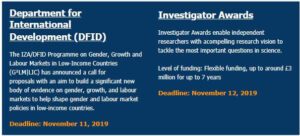World Food Day- Fixing the Food System in Nigeria
Held annually on 16th October, World Food Day is a day of action dedicated to tackling Global Hunger with global awareness on the near epileptic global agricultural system, thus calling the attention of all to know that zero hunger can indeed save the lives of more than 3.1 million children every year.
Every day, soils, freshwater and oceans rapidly lose value, while climate change is putting even more pressure on available resources, increasing risks associated with disasters such as droughts and floods
Research reveals there is enough food production to feed inhabitants of Planet Earth, yet, about 800 million suffer from hunger still. That is one in nine people.
Consequently, wiping out malnutrition is one great challenge that cries for change yet reports show that one in nine still go to bed on empty stomachs every night. Even so – one in three suffer from malnutrition.
Meanwhile, mal-nutrition is estimated at 2.7 million child death rate annually. The first 2 years of a child’s life are particularly important, as optimal nutrition during this period lowers morbidity and mortality, reduces the risk of chronic disease, and fosters better development. However, many infants and children do not receive optimal feeding. According to UNICEF only about 36% of infants aged 0–6 months worldwide were exclusively breastfed in 2007-2014.
It is sad to know that while malnutrition exists; overweight also poses threat to the growth and development of children. UNICEF, WHO and World Bank – 2016 estimates reveal that the number of overweight children in Africa increased by more than 50 percent between 2000 and 2015.
While the Planet continually needs food, the world also needs to know that Agriculture is the single largest employer of labor in the world, providing livelihoods for 40 per cent of today’s global population. The largest source of income for poor rural households.
FOOD INSECURITY
Humans need food. But the complexity of delivering sufficient food to world’s population shows why food security should be a top priority for all nations, whether developed or developing.
- Population Growth – This varies considerably across countries. Africa is expected to double its population from 1 to 2 billion by year 2050, hence the need for food chain
- Climate Change– Currently, about 40% of the world’s landmass is arid, and rising temperatures will turn yet more of it into desert. At current rates, the amount of food grown will feed only half of the population by 2050.
- Water Scarcity –This is another impending crisis: 28% of agriculture lies in water-stressed regions.
- Small Scale Farmers – In developed countries, less than 2% of people grow crops and breed animals for consumption. In developing countries, even fewer people are choosing farming as an occupation. Meanwhile, food prices are rising, arable land continues to be lost to urban sprawl.
In Sub-Saharan Africa, records reveal that the Continent remains the only region with the highest prevalence of hunger, with the rate increasing from 20.7% in 2014 to 23.2% in 2017. The number of undernourished people increased from 195 million in 2014 to 237 million in 2017
(UNICEF 2017) tells us Nigeria is the most populous nation in Africa with almost 186 million people in 2016. By 2050, Nigeria’s population is expected to grow to a staggering 440 million, which will make it the third most populous country in the world, after India and China (Population Reference Bureau 2013).
According to the World Bank (2017), Nigeria’s economy is the largest in Africa and is well-positioned to play a leading role in the global economy already. Despite strong economic growth over the last decade, hunger dwells in the country still.
Currently, Nigeria ranks 145th out of 157 countries in progress towards achieving the Sustainable Development Goals (SDGs). It is quite unfortunate though to know that 37% of children under 5 years are stunted. While stunting prevalence has improved since 2008 (41 percent), the extent of acute malnutrition has worsened, from 14% in 2008 to 18% in 2013. (National Population Commission and ICF International 2009 and 2014).
The causes of malnutrition and food insecurity in Nigeria remains: Poor infant and young child feeding practices, which contribute to high rates of illness and poor nutrition among children under 2 years; lack of access to healthcare, water, and sanitation; armed conflict, particularly in the north; irregular rainfall; high unemployment; and poverty – (Nigeria Federal Ministry of Health, Family Health Department 2014). Although food insecurity spreads throughout the country, with the impact of conflicts and other shocks which have resulted in food insecurity particularly in the North East zone; an estimated 3.1 million people in the states of Borno, Yobe, and Adamawa received emergency food assistance in the first half of 2017.
For sustainable food security, Nigeria launched its “Zero Hunger Initiative as outlined in the National Policy on Food and Nutrition and National Strategic Plan of Action for Nutrition ahead of the AGENDA 2030 deadline of UN’s Sustainable Development Goals. It is therefore imperative to ensure that the country and the world at large continue to take necessary measures to prevent and reduce hunger and under nutrition by creating sustainable agriculture. Addressing hunger and which requires improvements in the agricultural sector thus need all stakeholders to come together facilitating partnerships at all levels, and encouraging the exchange of knowledge for growth and development through healthy consumption





